About twenty years ago, at a bluegrass festival in Oregon, two young mandolin players met and quickly bonded over their shared passion for the instrument. Flash forward to a few short years ago, and Jesse Jones and Jacob Jolliff reconnected to form the string ensemble EZRA alongside banjo player Max Allard and bassist Craig Butterfield. Jones is a Rome Prize-winning composer and professor at the Oberlin Conservatory of Music. Jolliff is a lifelong prodigy and well-renowned mandolinist in the bluegrass world, having performed with Yonder Mountain String Band and Béla Fleck in addition to leading a successful solo career.
EZRA's music is the product of a highly dedicated collective of musicians, whose comfort with both the compositions and each other has reached new heights on Froggy's Demise. Jones's ornate compositions come across with enough complexity to be studiously revered, while incorporating enough melody to create memorable passages and toe-tapping rhythmic interplay. The record's title track shows this balance between EZRA's lush melodic moments and the complex time-skipping sensibilities, in somewhat of a cinematic battle between light and dark. Jolliff and Allard's instrumental harmonies on "Narny" tumble into one another with a lilt and grace that comes naturally to the quartet on their third record.
I spoke with Jesse Jones and Jacob Jolliff about their musical histories, the balance between art and education, and how EZRA continues to pump out world-class arrangements with yet another record on the horizon following the release of Froggy's Demise. This interview has been edited for clarity and length.
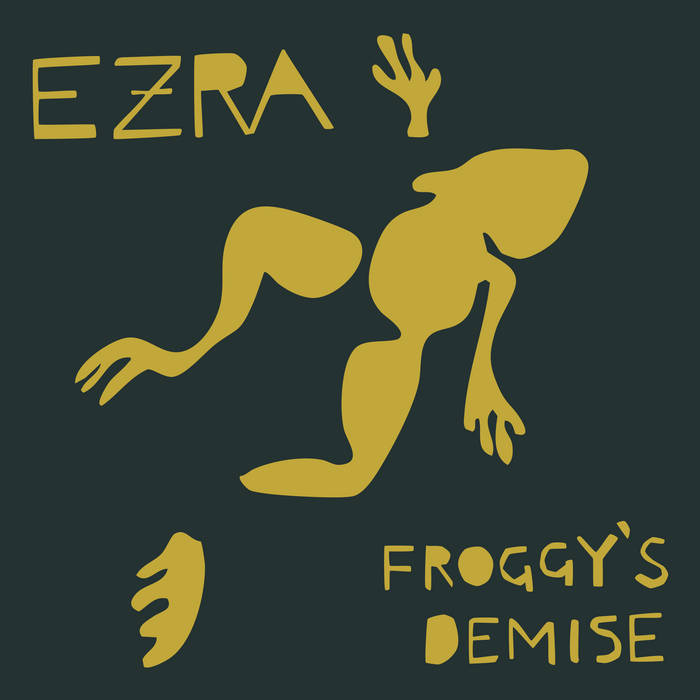
Fellow Mandolin Pickers
Sam Bradley: How did the members of EZRA all get connected?
Jesse Jones: I guess we have to go back in time quite a ways, maybe twenty years or so, when Jake and I met at a bluegrass festival in Oregon. I think it was either Stevenson or Hood River or someplace like that. Jake was only eleven years old, and he was a mandolin whiz already at that age. We just started hanging out; we both had J.J. as our initials, and both played mandolin. We also share the same birthday, but separated by ten years. We went our separate ways, but then got back in touch with each other a few years ago and just decided to do a project together. That's where EZRA stems from.
Jacob Jolliff: Just to add to that, about four or five years ago, I ran into a friend of mine from Berklee who is also a college professor. He was like, "Do you know Jesse Jones?" I was like, "Well, I know Jesse Jones from twenty years ago, but I haven't talked to him in like fifteen years." He told me, "Well, Jesse is a tremendously successful classical composer." I guess I knew Jesse always had a foot in that world, but we had mostly hung out as fellow mandolin pickers. It just sort of reminded me of Jesse's existence, and then I found him online and we started chatting about music and what we've been up to. Then Jesse made the first EZRA project happen, in conjunction with having me out to Oberlin to do some mandolin teaching. Jesse also got the other two guys in the group involved.
Jesse: I've worked with the bass player Craig Butterfield for many years. We were actually in a duo together for all that time and have three records together. So I knew I wanted to work with him.
Then, here at Oberlin, there was a student named Max Allard, a banjo wizard who had grown up playing the instrument at a remarkably high level. I decided it was time to form the band, as we had the core members available and willing.
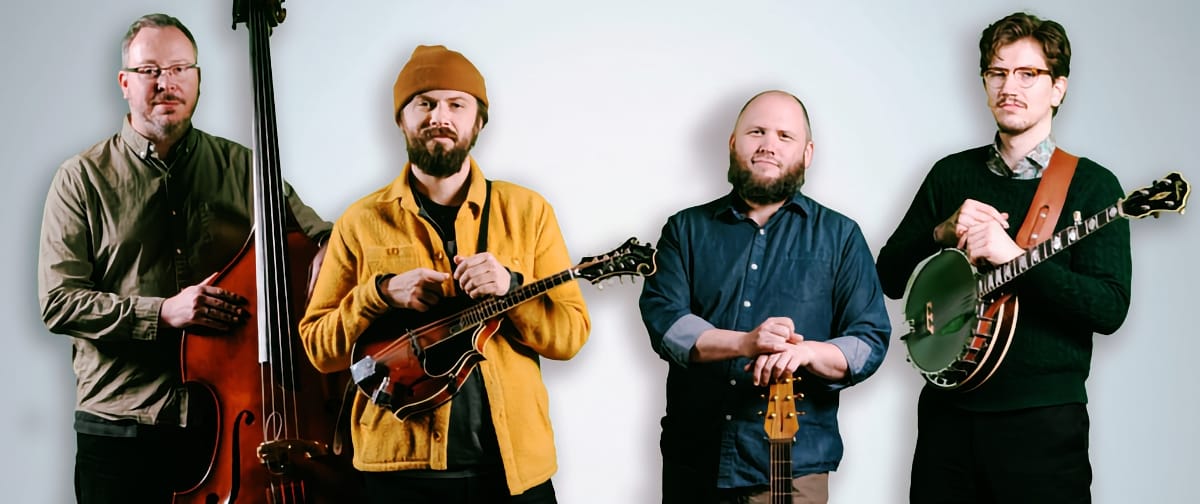
Sam: It sounds like it was a lengthy process to fully form and realize the group. How has your education background inspired or changed the way you handle a highly technical project like this?
Jesse: Well, I went to school not as an instrumentalist but as a composer. I've dabbled in a lot of different instrumental techniques. I always joke that I don't play any particular instrument all that well, but I play many of them kind of okay. As a composer, that's influenced my ability to write and conceive music for a variety of instruments. But the music education is aesthetics. A lot of what I do in this bluegrass-adjacent context stems from what I know in the classical composition world—different composers like Bartók, Hindemith, Stravinsky, all the way back to Bach and Beethoven—and just the synthesis of my language into this sort of more rootsy language that EZRA uses. I guess that's what I'm after: a synthesis of all the techniques that I love from classical music, things like counterpoint and form, mixed with the virtuosity of the roots music that I know and love. I was searching for virtuosos who could deliver on both fronts, like Jake, Max, and Craig.
Jacob: Well, I would say Jesse plays a lot of instruments quite well. He's not the "jack of all trades, master of none." I think he's just a master of an incredible amount of them.
I think the cool thing, too, is that Jesse has all these classical composition chops, as much as you could have within that field, but he's also not just a dilettante. He's not just dabbling in bluegrass. He went through a phase of being obsessed with the luminaries within bluegrass, dedicating his whole life to playing the mandolin and guitar. So when he goes to write something in that vein, it's not like he's just the classical guy who's just sort of dabbling in it and is going to do a bunch of stuff that's not hip or idiomatic within the genre. He's grounded in both fields, and that's what makes his tone so great.
Sam: With the somewhat juxtaposed nature of classical compositions and traditional bluegrass, how do you find the balance with this project? Is there any sort of conscious effort to hold that balance, or does it come naturally?
Jesse: My whole career, I've been trying to synthesize the two worlds in a way that makes sense. I often refer to composers like Stravinsky and Bartók because both drew on folk music as a primary source of their material. Their musical language stems from folk music. They came up with a particular compositional language that allowed them to accept more chromaticism, or more pitches than would normally be there.
Coming from the bluegrass and classical worlds, I find myself wanting to do something similar with the folk music I know, such as bluegrass tunes, fiddle tunes, and my original fiddle tunes, which are often diatonic and tonal works that feature the resolution of chords with functional harmony. I also try to bring in this language that accepts chromaticism at the same time. It's only been in the last five to seven years, maybe, that I found myself able to make music that synthesizes this in a way that feels fulfilling.
Jacob: I feel that when I try to play genres that I didn't grow up playing, like classical music or jazz or lots of other things, I'm constantly worried that I'm speaking with an accent and that I'm missing some crucial thing and making it sound awkward. I think the flip side of that is that I feel like I’ve grown up living and breathing a certain music, being around it culturally, and going to bluegrass festivals and things. I can kind of play whatever in terms of chromaticism or anything. Even without trying, it's still going to sound like bluegrass.
It's like a blessing and a curse; when I go to play other things, they probably sound too bluegrass-y. Because I have lived and breathed bluegrass, I can throw a lot of new influences into my writing and improvisation, and know that at the end of the day, it's most likely still going to sound like bluegrass to people. That's just like my first language, and anything I play is going to have that bend towards bluegrass.
Sam: Do you think that bluegrass and jazz, or classical music, have a bigger overlap than people might imagine? Why do you think the bluegrass string format is a good vessel for complex compositions?
Jacob: I mean, there's been a lot of collaboration between bluegrass and jazz musicians and bluegrass and classical musicians in the last thirty or forty years. In terms of bluegrass and jazz, they're both forms that involve a lot of improvisation. There are other forms, such as swing music, blues, and Texas fiddle music, that perhaps blur the lines even more.
So those lines can be blurred, I think, for pretty obvious reasons. They're both American improvisational forms of music. I wouldn't necessarily say that bluegrass is incorporating more of that than jazz or classical—that's just the form that I'm in. Just like Jesse was talking about, Bartók was using folk forms, and I think there are contemporary composers who are inspired by roots music.
Within jazz, there are artists like Julian Lage and Pat Metheny, as well as those who have incorporated folkier or bluegrass elements without collaborating with bluegrass musicians. Maybe part of it is that the level of virtuosity has gotten crazy high within bluegrass in the last thirty years and allowed for some more of those influences to come in. It's always been kind of a melting pot. You think of Bill Monroe and the Bluegrass Boys—he didn't just appear fully formed, but he was already this amazing meld of different influences.
Everything Kind of Swings
Sam: I'm curious about both of your thoughts on the bluegrass community in recent years. Do you feel the genre is having a particularly strong moment right now?
Jesse: From my position, I feel like we often have these kinds of renaissance moments where certain music comes into popularity. For instance, the mandolin was once the most popular instrument in all of America. Then that went by the wayside for the ukulele, which was the new thing. Even at an instrument level, this happens.
I think in my lifetime, there were two catalysts for a sort of bluegrass renaissance, even though there were tons of things happening. One was the movie O Brother, Where Art Thou? That had a huge impact. Then there's Alison Krauss and members of her band. Also, the next phenomenon was this young band Nickel Creek, which sort of grew up learning the licks of early Béla Fleck, Edgar Meyer, Mike Marshall, and Sam Bush. They took it to a new level and incorporated a lot of what they knew as bluegrass musicians into a pop music format. Now we're sort of in the Billy Strings phenomenon. Everything kind of swings, and I would say ‘yes’ in the last five years, but there have been various moments like this throughout bluegrass's history.
Jacob: The Billy Strings thing is somewhat unique because it's the first time there's been an actual legitimate bluegrass band touring the country and playing arenas. That's never happened before, except for the occasional use of a banjo or mandolin on a couple of songs in big country acts. Billy and his band "jam out," and they have a crazy light show and all that, but a lot of times they're playing pretty straight-ahead bluegrass and are a great bluegrass band. That to me feels pretty unique.
There have been other moments when it kind of jumped into the popular eye—everything from The Beverly Hillbillies to Deliverance. Sometimes, those situations only perpetuated negative stereotypes, portraying a sort of backwoods and crude image that is not very accurate.
Sam: Could you sort of walk me through how the compositions get formed, or maybe how they get pitched, and how those ideas snowball into a full track?
Jesse: I think this evolves over the course of being a band. The way we did it on Froggy's Demise is very different from what we did on our first album or our second album. I guess the main thing is that when we first got together, those were all tunes that I had written and had been sitting on for the past decade or so. I just charted out nine tunes that I had lying around and gave those to the guys. We just sort of made an album out of that. For the second album, more of us contributed tunes, sort of in chart form. When I say a chart, it's basically the formal parts with maybe the melody, but so much of it is kind of bare bones given to the band, and then we figure out the form together. So there's the compositional aspect of the form and who's going to go when—the orchestration of it is a kind of collective effort. Now we're leaning more and more towards having original compositions by everyone.
We all work in very different ways. When Jake has a tune that he's written, none of it's written down; we just learn it by ear. He has a very sort of direct way of coaching the band. Whereas, as a composer, I get as much figured out before I ever bring it in as I can.
Jacob: Some of us are much more lazy when it comes to making charts. That would be me. (laughter)
Sam: Is that a difficult sort of mental switch to flip?
Jesse: Absolutely. I'd say that this gets down to one of the crucial differences between folk music or bluegrass and classical composition. Jake is, I think, just one of the most incredible musicians playing today, between mandolin playing and just imagination as a musician. He primarily grew up learning tunes by ear. I don't want to put words in your mouth, Jake, but from our conversations, it’s clear that music notation was secondary to learning by ear and improvising your own material over chord progressions.
That's like the polar opposite of being a classical musician, where there's hardly ever any improvisation over a chord progression. You learn by eye on a sheet of music. It's not that one is necessarily better than the other. It's just a different way of achieving music, but there is just a stark difference in the way that we learn music. I'm much faster at learning if I see it written down—I can assimilate the notes and the feel of it much quicker than if I were going to do it by ear. I think Jake is the opposite, and maybe everyone else in the band, except me, is like that. We make it work.
Sam: How much of a focus on improv was there during the sessions for Froggy's Demise?
Jesse: I would say that there's the basic chart, which is sort of the bulk of the material for the tune. But at least 80 percent of our tunes are improvised at least on the soloist level. Primarily in the studio, we’re recording takes of the solo until we find one that we like for the record. In the case of Jake, Craig, and Max, those are all improvised, and they're different every time.
So it's like a jazz chart in that way, where there's a head that you play, then you go through that form and the chords of that form, and someone will solo over it. What makes our tunes difficult is that there are changes, and it’s not just in 4/4; we might be in 11, 15, or 17, or something else, and it’s always shifting. However, it’s not just shifting between asymmetrical meters all the time. Most of it is improvised, even though we try to have as much structure as we can through the chart.
Jacob: It's sort of like talking about the blending of the three genres: classical, bluegrass, and jazz. Each of those approaches has its place in EZRA tunes, as some aspects resemble a jazz lead sheet, where there will be completely improvised solos over a bed of chord changes. In our case, sometimes it’s complex chord changes, and what's going underneath is pretty complex rhythmically. Yet the solo is being improvised, and most of the time, the comping—meaning the rhythm instruments—what they do is being left up to the individual.
That's another part of improvisation that we take for granted in bluegrass and jazz—that their accompaniment is often improvised. So it's not just the solo that might be different every night, but how it's accompanied will also be different. However, the EZRA music also has composed parts, where one or two, or all four people, will do the same thing in that part of the arrangement, such as playing a line with a counter line. On top of that, it's all being sort of spoken with a bluegrass accent just in terms of the feel. All three of the genres and languages sort of can be heard within each tune, I'd say.
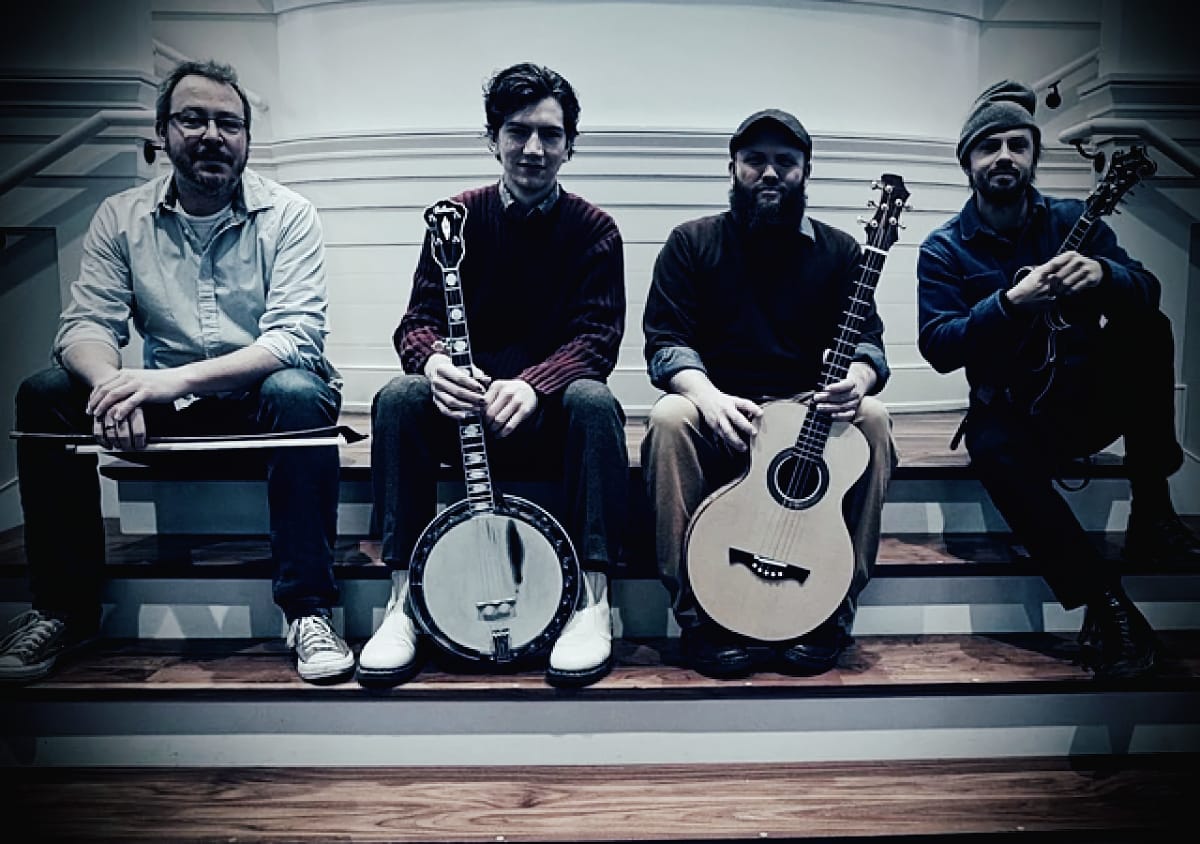
We're an Album Band
Sam: You guys don't play many live shows with EZRA, do you?
Jesse: We’ve a running joke that we have more albums recorded than we've done live gigs.
Jacob: It's pretty much true. We just recorded our fourth album, and the one we're talking about here (Froggy's Demise) is our third record. We already have another one in the can, and the band has only been around for about two and a half years or less.
Touring is just pretty unwieldy. I tour full-time with other groups, and two of the band members, Jesse and Craig, are full-time college professors. Max, until recently, was a full-time student. We haven't done a lot of touring as a group, though we certainly gig and have toured a lot individually. It's kind of just an album band right now. Maybe that will change at some point in the future, but I think all four of us simply love to arrange material and record, and it brings together many of my favorite things about playing music. Playing gigs would be fun, but also, if we just make albums, that's fine by me.
Jesse: Me too. That's kind of my favorite part. Largely, the project has a lot to do with just getting together a couple of times a year and making music with these particular people. Our second album was with Mark Stewart, who does everything really well, and he’s incredibly charismatic, a great musician. Our next album, which we’ve got in the can, features a pianist friend of ours.
Part of it is the act of making music that's new, and we're bringing it into the world. That part is more like classical music, whereas all my work as a composer involves composing a piece, getting it performed to a certain level, and then recording it so that the piece exists and we've created it. It's much less about the touring of the material. That aspect is much more classically oriented, I guess. We've played some live shows, and it’s always really fun, but the logistics of where we all are in our different careers make full-time touring difficult. So far, our focus has been on the recordings themselves.
Sam: Even with that expertise, that is a lot of difficult music to release in such a short window. Is there a particular X-factor that you attribute to your ability to accomplish so much?
Jacob: Two words: Jesse Jones. (laughter)
Well, I think Jesse's super prolific in life, and certainly when it comes to composition. There's a huge lion's share of the material that comes from Jesse's output. That enables more albums to be made. Also, with Jesse being affiliated with a couple of different universities, there have been opportunities for funding and recording through those connections.
Jesse: I mean, everyone in the band is incredibly prolific in terms of composition. Maybe 50 to 60 percent of the tunes are written or co-written by me, but everyone is an excellent and prolific composer. We just have tons of material that we're anxious to get down—four albums worth now.
So that's been great, but I think it wouldn't have been possible if we hadn't had a couple grants. For instance, I'm also a luthier. I build instruments, and I received a grant from Cornell University to create some microtonal instruments, which are very different from anything typically found in bluegrass. I pitched to them like, "Well, what if I play the instruments that I've built in tandem with this other person who's built instruments on the same grant, and we make an album out of it," and that became our Earth to EZRA album, which was the second one. That grant funded that album. Funding is vital, and one of the benefits of being affiliated with a university is that you can apply for grants like these. I don't think our output would be as prolific without such opportunities.
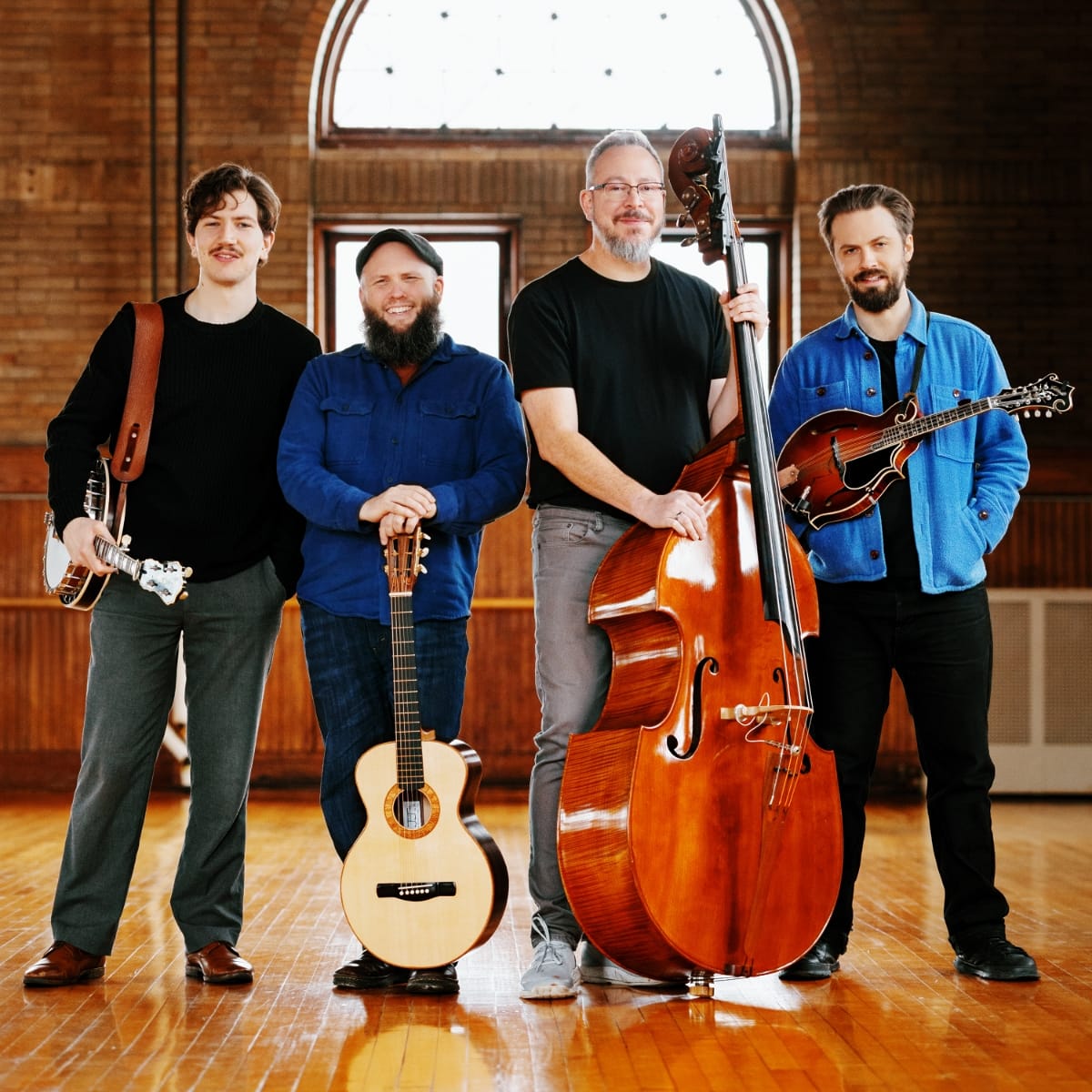
Sam: How important are dynamics in an acoustic, four-piece ensemble? How does it differ from writing for an orchestra?
Jesse: That's one of the most challenging things. If you think of an orchestra with seventy cellos, violins, violas, and basses, and then a whole rank of brass and winds, they can play pianississimo, as quietly as possible, where we can barely hear it, to ear-splittingly loud. They have a vast dynamic range.
When you're just talking about four instruments that are plucked, it's hard to be super quiet, and it's also hard to be really loud. The dynamic range shrinks a lot. So what we try to do is just really think about who's playing behind who and how many people the whole band is going to be. One thing Jake is good at is saying, "In my solo, how about we just have banjo accompany my solo," and that shift in instrumentation is how dynamics are mainly achieved. It's more centered around the number of instruments being played, rather than how they are played.
Jacob: I mean, I think for me some of it, too, just comes out of that selfishness or necessity of not wanting to have to play over too many instruments. Playing louder is harder, and I want to be able not to play my loudest all the time. But also, if you're improvising and you're building a solo and it starts with just one accompaniment, then every person who comes in helps you build the solo, and it's this real, tangible way in which the volume and energy keep on building up.
Having performed live extensively with my other group, which shares a similar vibe to EZRA, I’ve noticed that when people fully drop out, it creates a level of drama that even the layperson can perceive when watching a group. Anyone will see, "Oh wow, it's just these two people now!" It can make it really obvious to the listener and the viewer what’s going on and how it’s different from what was happening thirty seconds ago.
Sam: On that train of thought, I pictured a lot of cinematic moments throughout the record. Do any of your compositions take influence from film?
Jesse: It's funny, you're not the first person to say that some of the tunes are cinematic. I think, especially in the context of some of our slower tunes, they could work great in a movie or something. I believe there are two things at play there. I don't think explicitly about how this might work in a film at all. I don't have any imagery that I'm thinking of as I'm writing a tune necessarily. It's so much more to do with harmonic movement, the flow of the melody, and the arc of the melody in tandem with the harmony.
I think that aspect may make it feel a little bit more classical, thus more like a film score or something. I think film composers also use the particular kinds of chords that I love and use, but there's no explicit connection in my mind beyond that.
There's a tune called "McLaughlin" where we wax poetic at the end. It's effusive and big; we've called that the Mahler section just because it's like a Mahler Symphony or something. That helped us remember where it was in the form when we gave it a name. That is a very classical diffusion of sound that isn't often in a bluegrass ensemble, and again, also a cinematic trope.
Sam: Is there any particular message that you guys want people to take away from the record?
Jesse: We don't have any sort of political bent or even artistic statements that I can conjure up. I just want to make tunes as good as possible with these particular people on a given album. That's the most unromantic thing I could probably say, but that's my reasoning for doing it.
As a composer, I'm really sort of pouring whatever emotion happens to be in a melody out into the world in a purely sonic form. While Jake and I can sing, and so can Max and Craig to some degree, I feel that sometimes words can over-enhance that emotive content. I’m not sure where I’m going with that, and honestly, I’m at a loss for how to answer that specifically, other than just saying "no, nothing."
Jacob: I guess there's one thing that's probably obvious to anyone about EZRA, if they know anything about the band—it's really that this band just likes playing together and making music just for the joy of it, as evidenced by our lack of gigs and amounts of albums. It's always an amazing time when we get together to work on music and shine in the studio. Everyone gets along well and just enjoys hanging out, so hopefully the music can be just as much fun to listen to as it is to make.
There are some great pop songs created by people, like the Eagles, who probably hate each other. In our case, it's the opposite. So I think at most you can just hope that the vibe when we're making the music will translate to the listening experience.
Jesse: Just to add one thing to this whole thing, if I can. Our second album was so different, and we were kind of worried about it when we were making it just because there's so much free improv on it. We'd make these jokes like, "Oh boy, our microtones are really going to draw in our audience." It turns out people have responded to it in a way. They call it a symphony, and they want to take it in as a whole album, with a symphonic scope.
I feel like that happened accidentally. We didn't plan for that to happen, but it’s just a perception of the album, and I think there's something beautiful in not trying to claim too much artistic reasoning. We, as a band and the composers, are the craftsmen who are making a thing, and then the other people see it or claim its artistic value. That's what I love about music—it's varied in that way. Someone might just want to listen to nice tunes, and that's as deep as it goes, but then someone else might want to take some deeper meaning from it all. That's great—that's the power of music.
You can visit EZRA at ezraquartet.com and follow the band on Instagram, Facebook, and YouTube. Froggy's Demise is out now on Adhyâropa Records. You can purchase the album from Bandcamp or Qobuz and listen on your streaming platform of choice.
Check out more like this:
 The TonearmLawrence Peryer
The TonearmLawrence Peryer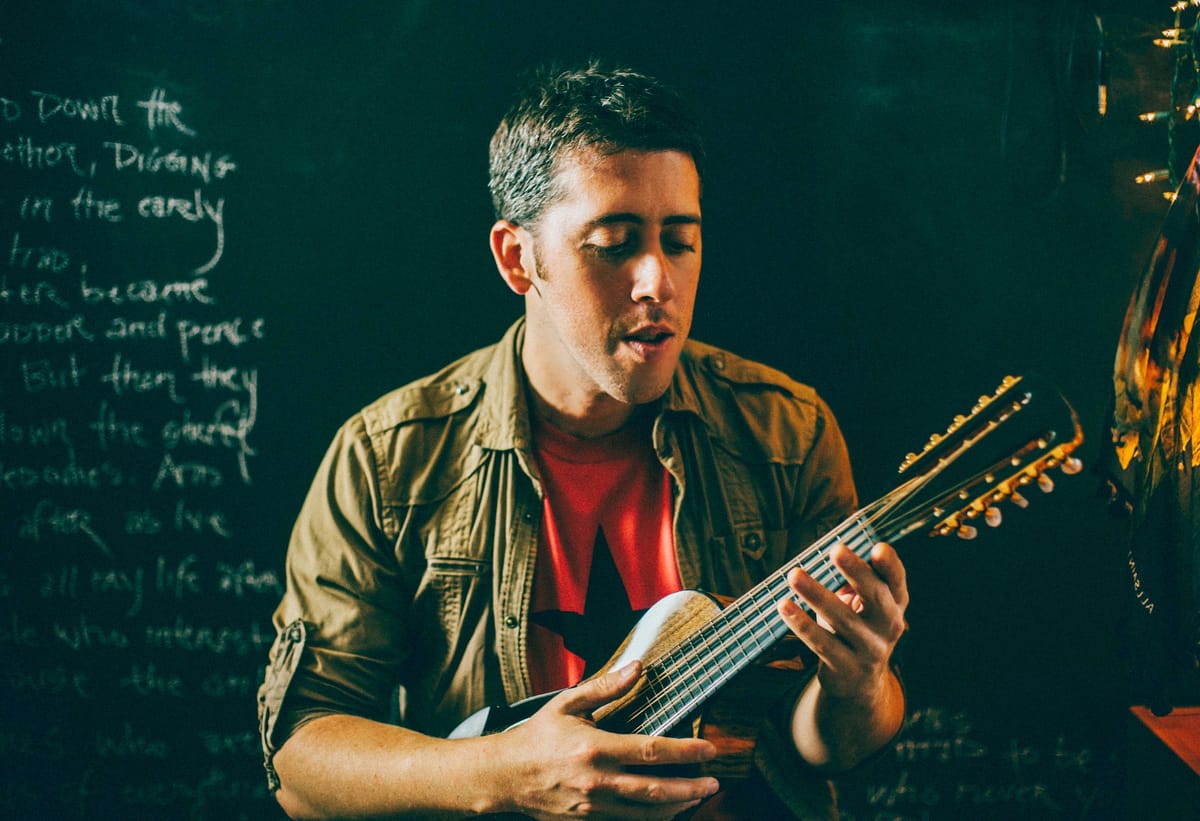
 The TonearmSam Bradley
The TonearmSam Bradley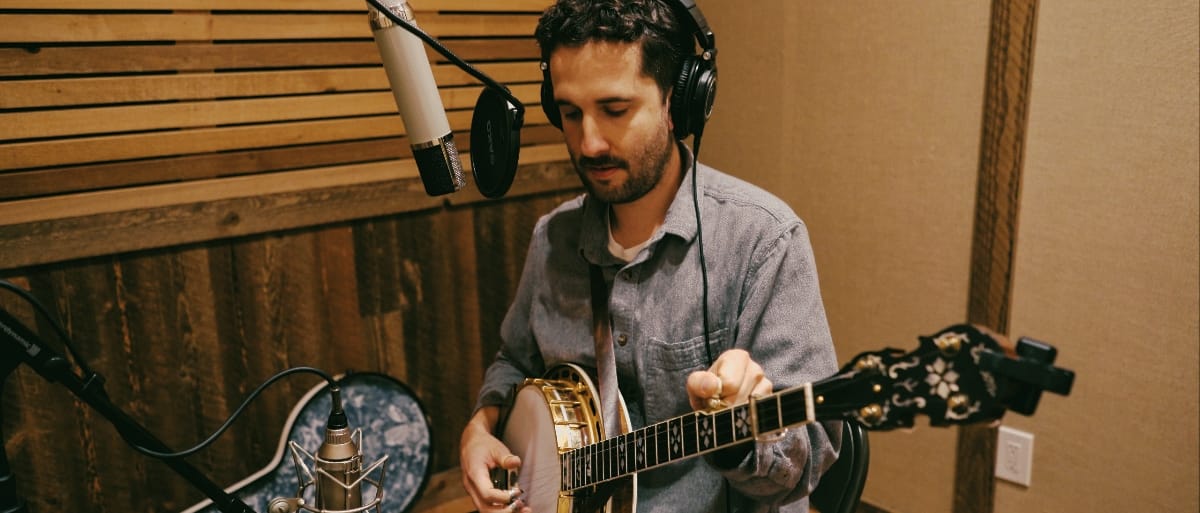


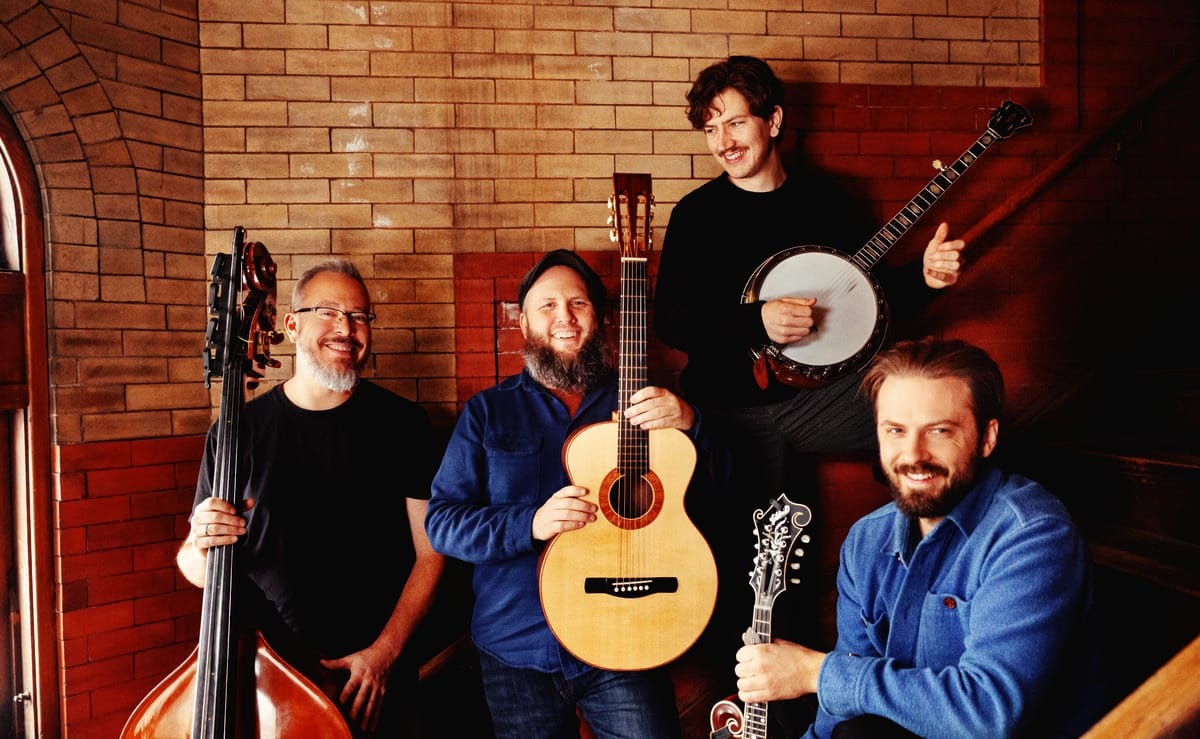

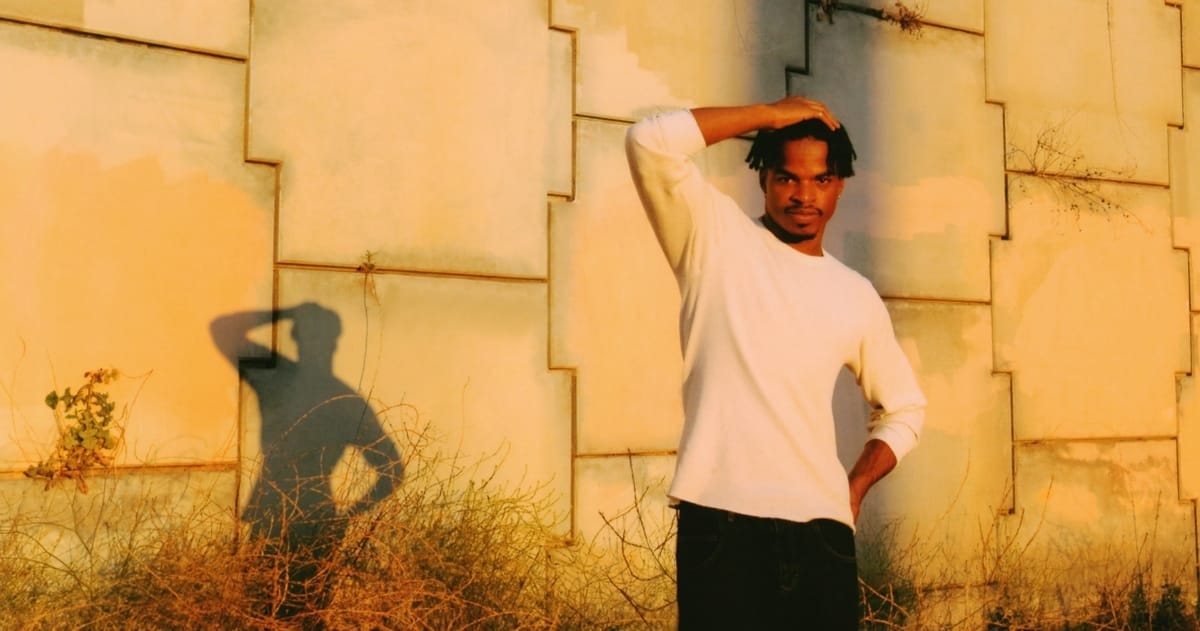
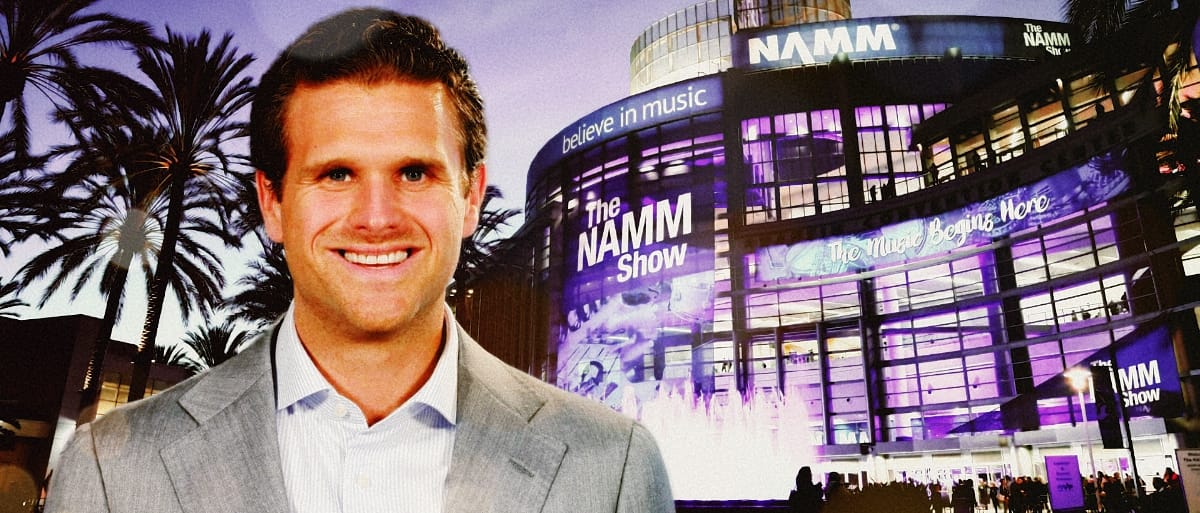
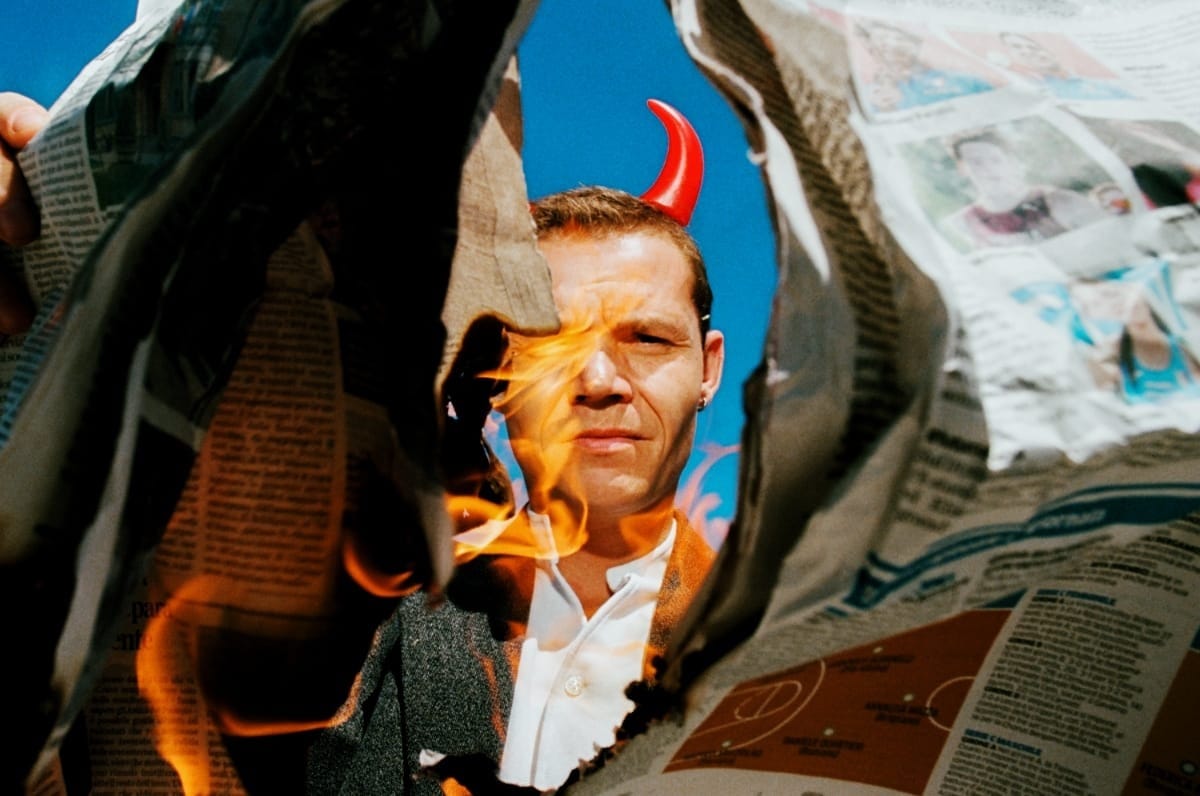
Comments